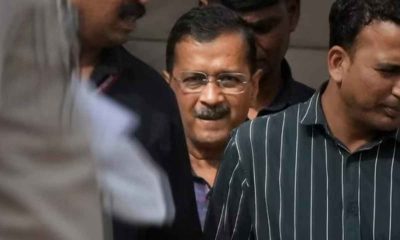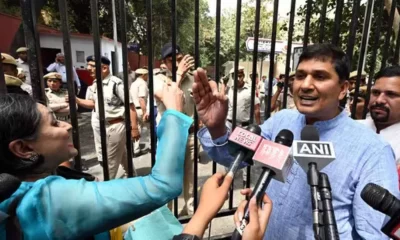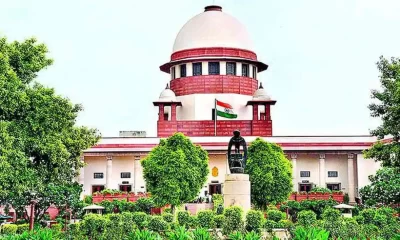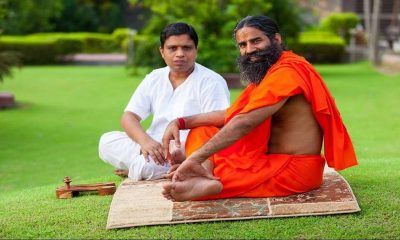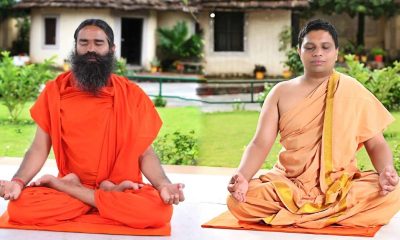India News
Judicial propriety debate reignites in Supreme Court

A three-judge bench headed by Justice Madan B Lokur stays implementation of a verdict delivered by a bench of similar strength headed by Justice Arun Mishra
A month after the famous “mutiny” by four senior-most judges of the Supreme Court stunned the nation and brought to fore a debate over judicial discipline, the issue of breach of propriety seems to have rocked the top court again.
On Wednesday (February 21), in an unusual turn of events, a three-judge bench of the top court comprising Justices Madan B Lokur, Kurian Joseph and Deepak Gupta stayed the implementation of a verdict delivered on February 8 by a bench of similar strength which comprised Justices Arun Mishra, AK Goel and MM Shantanagoudar. The Bench headed by Justice Lokur also restrained all high courts from entertaining or passing any order on land acquisition matters on the basis of the February 8 verdict delivered by the bench headed by Justice Arun Mishra.
The interim order by the bench headed by Justice Lokur came during proceedings in a special leave petition related to land acquisition. The State of Haryana (petitioner) and M/s GD Goenka Tourism Corporation Limited (respondent) were the parties in this case. The February 8 verdict was delivered on another land acquisition case (related to Indore Development Authority) which had effectively overturned a judgment delivered by a three-judge bench of Justices RM Lodha (now retired), Madan B Lokur and Kurian Joseph on January 24, 2014 (this case was about land acquisition carried out by the Pune Municipal Corporation) terming it “per incuriam” (decision rendered without taking care of facts and law).
As per judicial convention, the court doesn’t adjudicate on the validity of a verdict delivered by a bench of identical strength and instead refers such a case to be heard by a larger bench.
The bench headed by Justice Lokur, will on March 7, conduct further proceedings in the matter to decide whether a reference should be made over the sustainability of the February 8 verdict to a larger bench of the Supreme Court.
It is pertinent to recall that Justices Lokur and Kurian Joseph were among the four senior SC judges – the other two being Justices Jasti Chelameswar and Ranjan Gogoi – who had, on January 12, addressed an unprecedented press conference to attack Chief Justice Dipak Misra and warn that all was not well in the apex court. Besides the Chief Justice of India, Justice Arun Mishra was the other target of the four judges. The ‘rebelling four’ were peeved at the fact that CJI Dipak Misra, in his capacity as ‘master of the roster’, had assigned some crucial cases – including the controversial petition seeking an investigation into the mysterious death of CBI Judge BH Loya – to the bench headed by Justice Arun Mishra, who is among the junior-most judges in the apex court hierarchy.
On February 8, the bench headed by Justice Arun Mishra had held that that once the compensation amount for land acquired by a government agency has been unconditionally tendered but the land owner refuses it; this would amount to payment and discharge of obligation on part of the agency. The verdict had added “the claimants/landowners after refusal, cannot take advantage of their own wrong and seek protection under the provisions of section 24(2) of the Right to Fair Compensation and Transparency in Land Acquisition, Rehabilitation and Resettlement Act, 2013” to reclaim land on the ground that they were not paid compensation within five years.
The verdict authored by Justice Arun Mishra was in stark contrast to the January 2014 judgement which had held that “deposit of compensation amount in the government treasury is of no avail and cannot be held to be equivalent to compensation paid to the landowners/persons interested… Under Section 24(2) land acquisition proceedings initiated under the 1894 Act, by legal fiction, are deemed to have lapsed where award has been made five years or more prior to the commencement of 2013 Act and possession of the land is not taken or compensation has not been paid.”
On Wednesday, as proceedings began in the State of Haryana v/s GD Goenka Tourism Corporation Limited land acquisition case, before the bench headed by Justice Madan B Lokur, counsel for the State of submitted that the matter is covered by the February 8 verdict “of a Bench of 3 learned Judges of this Court”. This triggered some other counsels present in the courtroom – including senior advocate Mukul Rohatgi – to urge the bench to hear their submissions too as they had been engaged in some similar matters and that the February 8 verdict had “unsettled a long standing statement of law and had very serious repercussions on land acquisition cases.”
Senior advocate Mukul Rohatgi provided the spark that reignited the “discipline” and “propriety” debate when he submitted: “when a Bench of three learned Judges does not agree with the decision rendered by another Bench of three learned Judges, the appropriate course of action would be to refer the matter to a larger Bench” while adding that even one of the three judges who presided over the Indore Development Authority case (the February 8 verdict) had held this same view but was overruled as the other two judges decided to pass a judgment overturning the conclusions of the January 2014 verdict.
Rohatgi added: “A Bench of three 3 learned Judges cannot hold another decision rendered by a Bench of three learned Judges as per incuriam,” even as he informed the court that “some cases have already been decided on the basis of the judgment rendered in the case of Indore Development Authority (February 8 verdict), without the matter being referred to a larger Bench… some similar matters are listed tomorrow as well and it is possible that in the next couple of days similar matters may be listed before various High Courts.”
The submissions by Rohatgi led to Justice Kurian Joseph remark that it was his “painful concern” that “if this court is to remain as one, it should be one and you have to make it one. You have to have proper judicial discipline for that”.
Justice Joseph – fifth in the hierarchy of Supreme Court judges – then added: “Be very clear, this is a matter of judicial discipline, judicial propriety and consistency. Can a three-judge bench over rule a three-judge bench verdict? It has to be referred to a larger bench in case of difference of opinion… correctness of judgement can be doubted but the bench of similar strength of judges cannot hold that the judgement rendered by the earlier one was wrong. Such a system works on hierarchy and it needs to be preserved.”
The top court can now refer the two conflicting verdicts (that of February 8 and the one delivered in January 2014) to the Chief Justice, urging him to set up a larger five-judge bench to hear the matter. The bench headed by Justice Lokur will decide on March 7 on how to proceed further with this piquant judicial situation.
“We are not going into the merits or correctness of the decision by Justice Mishra’s bench. We are only concerned with judicial discipline,” Justice Joseph remarked while adding that the well-settled principle of the Supreme Court “is that you can’t tinker with the system”.
The bench noted in its interim order of February 21 that: “we are of the opinion that it would be appropriate if in the interim and pending a final decision on making a reference (if at all) to a larger Bench, the High Courts be requested not to deal with any cases relating to the interpretation of or concerning Section 24 of the Right to Fair Compensation and Transparency in Land Acquisition, Rehabilitation and Resettlement Act, 2013.”
The Bench also directed the Secretary General to “urgently communicate this order to the Registrar General of every High Court so that our request is complied with” and added that “insofar as cases pending in this Court are concerned, we request the concerned Benches dealing with similar matters to defer the hearing until a decision is rendered one way or the other on the issue whether the matter should be referred to larger Bench or not.”
2024 Lok Sabha Elections
Mallikarjun Kharge vows to continue politics till his last breath to defeat BJP
The 81-year-old Congress leader was speaking at a election rally in Afzalpur and said that if the people did not vote for the Congress candidate, he would think that he did not have any place in Kalaburagi anymore.

Congress President M Mallikarjun Kharge on Wednesday appealed to the people of Kalaburagi to at least attend his funeral if they thought he worked for them even though they do not wish to vote for Congress in the ongoing Lok Sabha elections.
The 81-year-old Congress leader was speaking at a election rally in Afzalpur and said that if the people did not vote for the Congress candidate, he would think that he did not have any place in Kalaburagi anymore. The Congress President sought an emotional chord with the people of his home district of Kalaburagi, Karnataka
The grand old party has fielded Kharge’s son-in-law Radhakrishna Doddamani from Kalaburagi, against BJP’s sitting MP Umesh Jadhav. Kharge had won the Lok Sabha elections from Kalaburagi in 2009 and 2014, but lost in 2019. He appealed to the voters to vote for Congress but at least come to his funeral if they thought that he had done some work in Kalaburagi. Kharge added that he would continue in politics till his last breath to defeat the BJP and RSS ideology.
The Congress leader said he is born for politics and whether or not he contests the election, he will continue to strive till his last breath to save the Constitution and democracy of the country. He asserted that he will not retire from politics. Kharge said that retirement happens from a position but one should not retire from his/her principles. He said he is born to defeat the ideology of the BJP and RSS and not to surrender before them.
He advised Karnataka Chief Minister Siddaramaiah, who shared the stage with him, to follow his principles. He said he had told Siddaramaiah many times that he may retire as CM or MLA, but he cannot retire from politics till he defeats the ideology of the BJP and RSS.
2024 Lok Sabha Elections
Nitin Gadkari says he’s better now after collapsing at election rally in Maharashtra’s Yavatmal
A disturbing video of the incident – which was unfortunately streamed live on X (formerly Twitter), including by his own account – showed Nitin Gadkari being carried away by those on stage, many of whom rushed to form a shield around the BJP leader to give him, and those treating him, some privacy.
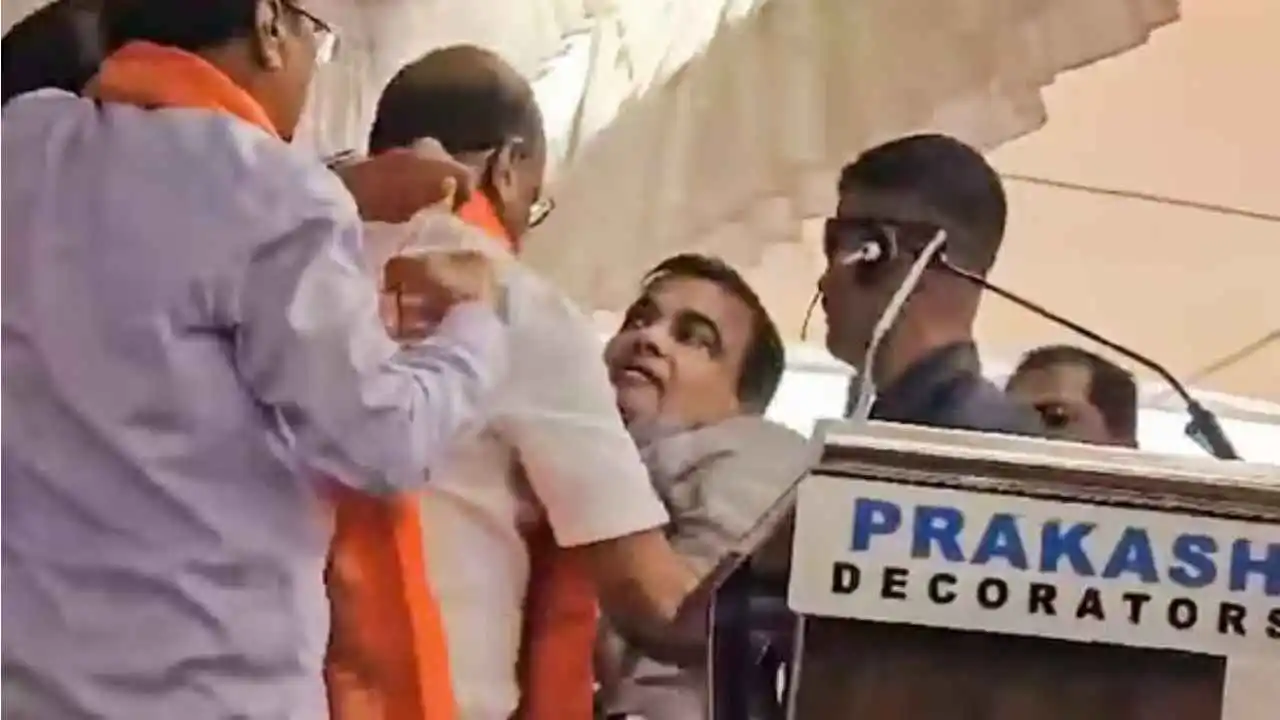
Union Road Transport and Highways Minister Nitin Gadkari collapsed while speaking at an election rally in Maharashtra’s Yavatmal on Wednesday afternoon. Fortunately, the senior Bharatiya Janata Party leader received prompt treatment and was able, after a brief pause, to get back up on stage and continue his speech.
A disturbing video of the incident – which was unfortunately streamed live on X (formerly Twitter), including by his own account – showed Nitin Gadkari being carried away by those on stage, many of whom rushed to form a shield around the BJP leader to give him, and those treating him, some privacy.
Nitin Gadkari took to X and informed that he felt uncomfortable due to the heat during the rally in Pusad, Maharashtra. But now he is completely healthy and is leaving for Varud to attend the next meeting. He thanked his supporters and well wishers for their love and good wishes.
Gadkari, who fought the elections in the first phase of voting as BJP’s candidate from Nagpur Lok Sabha seat, was campaigning for Eknath Shinde-led Shiv Sena leader Rajashree Patil in Yavatmal’s Pusad. Addressing the rally, the union minister said, he was confident that the people of Yavatmal district, which has a constant tendency towards development, will give victory to the BJP-Maha alliance, which believes in all-round development.
Gadkari posted on X that as the nation moves towards a developed India, under the leadership of Prime Minister Narendra Modi, significant work has been done in the last 10 years in the areas of roads and highways as well as health, education and other sectors across the country. He said many schemes of the central government were successfully extended to the rural areas. Due to this, along with the city, the people of the rural areas are also able to benefit from many important facilities.
The Yavatmal constituency along with Akola, Buldhana, Amravati, Hingoli, Wardha, Parbhani and Nanded in Maharashtra are scheduled to vote in the second phase of the Lok Sabha election on April 26.
2024 Lok Sabha Elections
PM Narendra Modi slams Congress over Sam Pitroda’s inheritance tax remarks, accuses Congress of intending to impose higher taxes
PM Modi was speaking at a public meeting in Chhattisgarh’s Surguja, where he alleged that the Congress wants to fill its own coffers by imposing ever higher taxes and not allowing people to pass on their hard-earned wealth to their children.
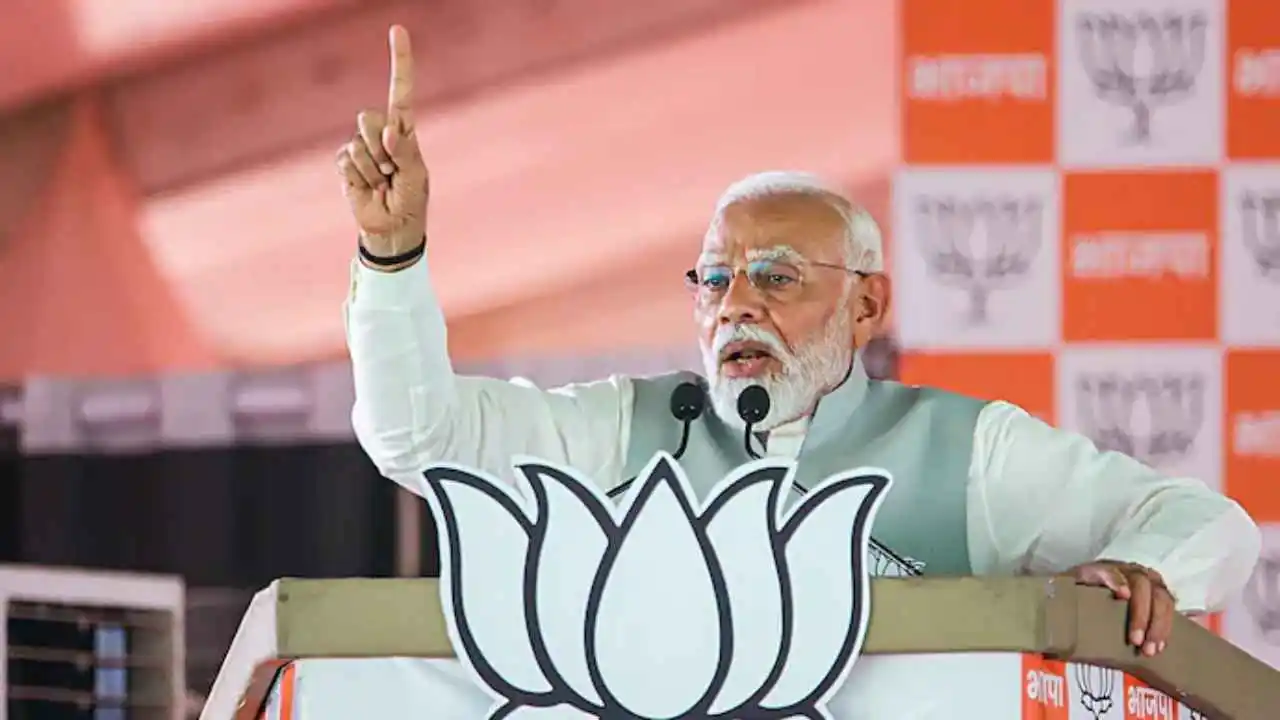
Prime Minister Narendra Modi on Wednesday launched a scathing attack on Congress after Sam Pitroda advocated for a US-style inheritance tax amid the ongoing debate over wealth redistribution. The comments have further fuelled an already-raging controversy over Rahul Gandhi’s promise to conduct a wealth survey if the Congress won the Lok Sabha election.
PM Modi was speaking at a public meeting in Chhattisgarh’s Surguja, where he alleged that the Congress wants to fill its own coffers by imposing ever higher taxes and not allowing people to pass on their hard-earned wealth to their children.
The Prime minister said the advisor (Sam Pitroda) of the prince and the royal family had said some time ago that more taxes should be imposed on the middle class. He said the Congress party says that it will impose an inheritance tax, and it will also impose tax on the inheritance received from parents. PM Modi added the children will not get the wealth that their parents accumulate through their hard work, rather the Congress party will snatch it away from them.
PM Modi said Pitroda’s remarks have exposed the dangerous intentions of the Congress. He took a veiled jibe at the Congress and said the party has only one mantra – to loot people zindagi ke sath bhi, zindagi ke baad bhi (in life and even after death).
The prime minister did not take any names and targeted the Gandhi family and said, those people who considered the entire Congress party as their ancestral property and handed it over to their children, now do not want Indians to pass on their property to their younger generations.
Indian Overseas Congress chairman Sam Pitroda while talking to the media backed his party’s stand on redistribution of wealth and called for a policy for the same while citing the concept of inheritance tax prevailing in some American states.
-
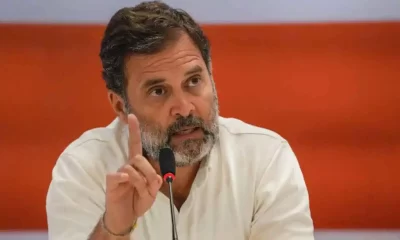
 2024 Lok Sabha Elections12 hours ago
2024 Lok Sabha Elections12 hours agoRahul Gandhi clarifies on wealth survey remark, says aim is to identify injustice
-
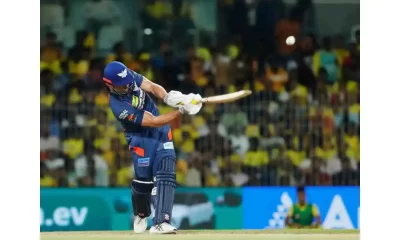
 Cricket news14 hours ago
Cricket news14 hours agoIPL 2024: Marcus Stoinis hits first IPL century as Lucknow Super Giants beat Chennai Super Kings by 6 wickets
-
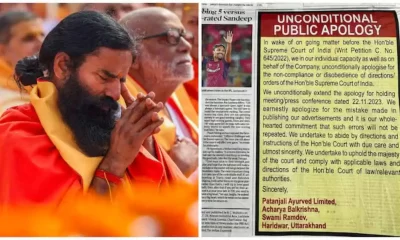
 India News12 hours ago
India News12 hours agoRamdev, Balkrishna publish bigger apology in newspapers after Supreme Court’s rap
-
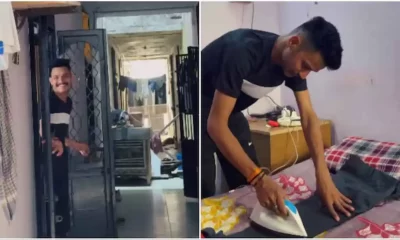
 Trending10 hours ago
Trending10 hours agoA waiter’s life: Social media users go emotional on watching viral video
-
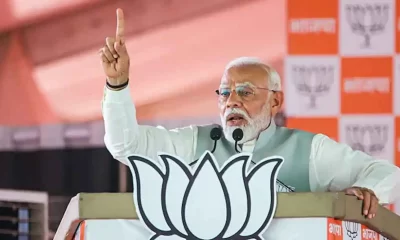
 2024 Lok Sabha Elections9 hours ago
2024 Lok Sabha Elections9 hours agoPM Narendra Modi slams Congress over Sam Pitroda’s inheritance tax remarks, accuses Congress of intending to impose higher taxes
-
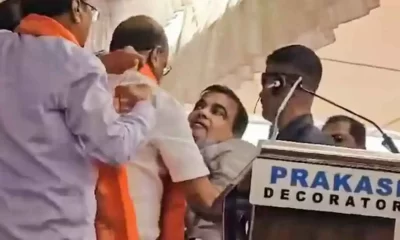
 2024 Lok Sabha Elections7 hours ago
2024 Lok Sabha Elections7 hours agoNitin Gadkari says he’s better now after collapsing at election rally in Maharashtra’s Yavatmal
-
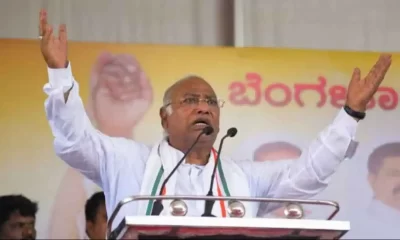
 2024 Lok Sabha Elections6 hours ago
2024 Lok Sabha Elections6 hours agoMallikarjun Kharge vows to continue politics till his last breath to defeat BJP
-

 Entertainment8 hours ago
Entertainment8 hours agoMadhuri Dixit, Karisma Kapoor recreate Dil To Pagal Hai dance battle on Dance Deewane

